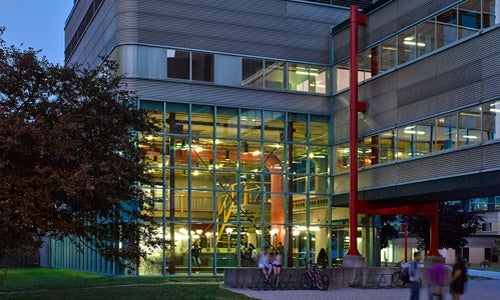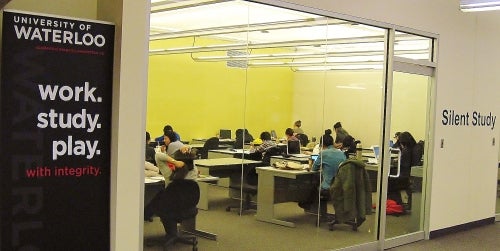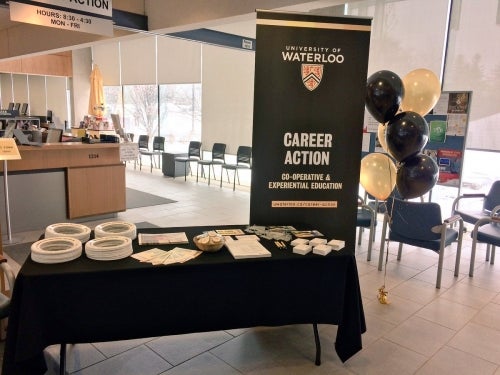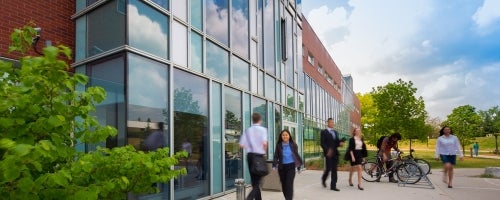David R. Cheriton School of Computer Science 50th Anniversary
Education and Academic Excellence

It’s one thing to be a pioneer in computing education, as the University of Waterloo was in the 1960s.
It’s quite another thing to maintain a place of academic excellence, as the University of Waterloo has done in its Faculty of Mathematics and the David R. Cheriton School of Computer Science.
The School, which is celebrating its 50th Anniversary in 2017, continues to grow and thrive. It is consistently cited as one of the top university computer science departments in Canada and internationally by ranking agencies.
It’s not easy.
Stephen Watt, the Dean of Mathematics at Waterloo and a graduate of the Cheriton School of Computer Science, said there’s a lot of hard work that goes into maintaining the sort of virtuous circle that perpetuates continued academic excellence and growth.
“We put a lot of effort into recruiting, through math contests, and sending people around the world to interview students and to give presentations and to do mathematical outreach, and so on. The ability to attract good students is number one,” he said.
Students are drawn to UWaterloo by the reputation not only of the School, but of the co-operative education program. It’s the largest such program in the world, and allows students to finance their education and gain relevant work experience in their area of study.
“They’ll be able to graduate debt-free, and they’ll have a stack of offers on their desks before they graduate,” said Watt. “Consequently, we have our pick of good students. For every qualified student we accept, there are 12 other qualified students standing in line behind them, hoping for an offer of admission.”
Watt added that strong students help to attract strong professors. Faculty members don’t have to dumb down their instruction, and are able to teach at a consistently high level.
“Our graduates graduate with better preparation, and we’re producing graduates that are amongst the best in the world,” he said. “That, combined with our intellectual property policy, means that we attract entrepreneurial, vigorous faculty members who are excited to be working with good students, and that makes it a great place to establish and invest in a research career. And that circles back to making it an interesting place to come for a student.”
The commitment to education and academic excellence has been in place since the earliest days of the University, before the Cheriton School of Computer Science and even the Faculty of Mathematics were officially founded.
Pioneers like Ralph Stanton, the first Chair of the Department of Mathematics back when it was part of the Faculty of Arts, set the tone in the early 1960s by making it his mission to recruit top students from all over Ontario. Stanton and colleagues like Ken D. Fryer quite literally blanketed the province, visiting every city and town with a high school to make people aware of the excitement that was brewing at the then-new University of Waterloo.
Outreach and recruiting, of course, are now done internationally, not just in Ontario. But it had to start somewhere, and the commitment first demonstrated by Stanton, Fryer, and their peers continues to be taken very seriously by those who follow in their footsteps.
“If you think about it, it’s an astonishing story,” said Dan Brown, the Director of Undergraduate Studies for the Cheriton School of Computer Science. “A brand new university in a bunch of cornfields with a tiny little math department and a bunch of brave, young professors basically doing a road show all over this whole province.
“That’s how we started. It’s quite astonishing, and it speaks to the bravery of those people from the ‘60s and ‘70s. We are living in the shadow of it, at this point. We are standing on the shoulders of giants.”
That’s a phrase also used by Mark Giesbrecht, the current Director of the School. When he first came to Waterloo in 2001, he immediately recognized the need to become involved in administration in the wake of the tech crash that happened in the early 2000s.

Enrollment in computer science programs was in decline around the world as parents, alarmed by the burst of the dot-com bubble, tried to steer their children away from tech careers. Giesbrecht became Director of Undergraduate Studies not long after his arrival, and got busy with curriculum development.
“There were exciting things going on then, as there are now,” he said. “There’s sort of a building on the shoulders of giants aspect to this. This is the place, even when I was graduating from high school, as a Canadian student who’s mathematically or computationally inclined, you knew about Waterloo as certainly a centre for education but also a centre for research in computer science and mathematics.”
But it took a commitment from everyone in the Cheriton School of Computer Science to make sure that that remained the case. Faculty members gave up their free time to participate in outreach events in high schools and at the Ontario Universities’ Fair, surprising students and their parents who hadn’t expected to actually meet and speak with working professors.
“That was unusual, but everybody stepped up,” Giesbrecht said. “We kept the machine moving. And since that time, since 2006, year upon year, the applications have gone up 15 per cent. It’s been huge.
“Now the sad truth is that we’re turning very strong students away, just because we don’t have capacity. Our biggest issue is capacity.”
Brown said the number of undergraduates in Computer Science has indeed increased, from about 2,000 five or six years ago to more than 3,000 today. That reflects a jump in the number of first-year students admitted, and in students switching to Computer Science from other programs in Mathematics.
“You’ve just started showing people the ways in which their day-to-day lives have been so transformed by computer science, and now we kind of have to hold them off with sticks,” he said.
Meanwhile, according to Srinivasan Keshav, a professor in the Cheriton School of Computer Science and also the Associate Dean of Graduate Studies for the Faculty of Mathematics, the number of graduate students in Computer Science doubled from 150 to more than 300 over a seven-year period between 2007 and 2014. Currently, there are about 350 graduate students.
Keshav speculated that interest in Waterloo will continue to grow as new political realities in the United States of America make Canada look like a better choice for people wanting to study and work in computer science.
“We are seeing a much higher quality of students and faculty applicants coming in,” he said. “I think for the next four, or perhaps even eight years, we’re going to be in very good shape.”
There are a number of reasons why undergraduate students choose the David R. Cheriton School of Computer Science for their education. For one, its size allows it to be incredibly diverse in terms of academics. And with that diversity comes a high level of freedom that students enjoy.
“We are probably the single-most complicated department on campus,” Brown said. “The only department that’s bigger than us is Electrical and Computer Engineering, and Engineering follows a fairly lockstep curriculum: ‘If you’re in 2A, you’re taking these courses.’ We don’t do anything of the sort.
“We have a core that our students have to take, but the order in which they take it, we largely don’t really worry about. And we give them something like 52 choices for third- and fourth-year electives.”
The School is able to do that because it has more than 80 faculty members, all of them experts in one or more aspects of computer science.
“For a fairly large fraction of those things that people are a world expert in, we offer a course in third and fourth year. It’s one of the things that’s special about us,” Brown said. “A lot of my job is controlling the chaos that comes from that degree of breadth and freedom, and that degree of expertise in so many different areas.”
But it’s an exciting challenge for him, and for the School, where administrators are determined to not rest on their laurels. Giesbrecht said they want to continue to reach out to other students on campus and let them know that they too can be part of CS.
“We have to find ways that we can draw people who don’t know about Computer Science, and say, this is what it’s really like. We want to talk to the rest of the University and say, come and look at us,” he said. “Even if you don’t want to be a computer scientist, you can still take these cool courses. And if you do want to be a computer scientist but you didn’t start out that way, here’s the way into the program.”
“Obviously digital literacy is necessary for any informed member of society. But we also think that it makes sense that students coming from different kinds of backgrounds should know more,” Brown added. “It’s a good thing for a Waterloo grad who’s going to go off and work in communications for a bank to know something about computer security. And we think we’re the people who should teach that stuff.”

Waterloo’s co-operative education program, as mentioned, is another significant attraction for undergraduate students. Scott Davis, a Faculty Relations Manager in Co-operative Education and Career Action, noted that almost every program at the University, including Computer Science, has co-op as at least an option. In some programs, it’s mandatory. Currently, Waterloo has approximately 20,000 students registered in co-op.
Davis said that students use co-op to see what kinds of careers they might be interested in when they graduate. It’s a low-risk way to investigate their options, and they get paid in the process.
“You test-drive different careers. Use your work terms as human laboratories, and suck up whatever information you can,” he said. “Work in a public company, a private company, do a small teamwork job, do an independent job, do a programming job, do a user-support job. Try a number of different scenarios; you have six work terms to play with, so try different jobs, so that when you graduate, you know what’s a good fit for you.
“You don’t waste your time applying to jobs that you know you’re not going to be happy in, which many regular students don’t have the luxury of finding out about until they graduate and get into the workplace. That’s when they start their test drive.”
Jo Atlee, the School’s Director of Women In Computer Science, agreed that co-op is invaluable. It perfectly complements what students are learning in the classroom, and helps them to be able to contribute more by giving them the hands-on training that they need to get better.
“There’s only so much practice that we can give as programming assignments in a course. It’s going to be a few hours a week per course,” she said. “But if students go off and work full-time every other term, they are getting practice at a level that you simply don’t see at any other institution.”
This is something that is widely recognized in industry, she added.
“I’ve been in international meetings where we had industrial panelists and we were trying to ask them what it is that we could be doing to improve education for computing. There were people there from Stanford and MIT and wherever, but the only school that the industrialists mentioned was Waterloo.
“They said, ‘Is there anybody here from Waterloo?’ I raised my hand, and they were like, ‘Go talk to her.’ It was huge. It was really flattering.”
While the size of the co-op program can make it a daunting task to find jobs for students, and to find the right candidates for employers, the advantages for both sides continue to make it a worthwhile endeavour. As Davis described it, it’s almost like a virtuous circle in itself.
“You go to a smaller university, you might have five or six or 30 students to choose from. Here, you’ve got hundreds. And so you can develop a really strong talent pipeline,” he said. “And students come here because of that.
"They come because they know it’s a quality program, they’re getting a great education academically, and they get access to what continues to be the crème de la crème of employers, because it feeds on itself. You get great students, that brings good companies. Good companies bring more great students. Great students bring more great companies.”
“When undergrads go on co-op and when they graduate, Waterloo is one of the main sources of hires for tons of Silicon Valley and Bay Area companies,” agreed Ian Goldberg, a Waterloo Computer Science graduate and the School’s current Director of Graduate Studies. “They know Waterloo, and they hire Waterloo more than almost any other place.”
That can be a problem, since the Cheriton School of Computer Science would obviously like to retain these students and convince them to lend their talents to graduate school and to academic research.
Giesbrecht said that when he was the chair of the School’s Graduate Recruitment Committee, he would arrange to bring together groups of talented undergrads and introduce them to research and the types of things they could do if they decided on graduate school.
“There are so many great companies out there right now who dangle large salaries in front of students, and it’s hard to keep them going in a research direction,” he said. “I understand it from the students’ point of view, but we have an obligation to show them that there is something else – that they can go and make a different kind of innovation in the research space as opposed to the industrial space.”
In a perfect world, Giesbrecht said, graduate students can enhance their education by interning at top companies, or they can even work directly with industry on specific research projects. After all, that’s what he and a lot of other professors have managed to do.
"Universities have become more collaborative outside of the academic box,” he said.

That opportunity to collaborate is winning over a lot of students. Goldberg points out that because the Cheriton School of Computer Science is so large, it can offer varied research opportunities, sometimes in collaboration with other departments in the Faculty of Mathematics, or even with other faculties on campus.
“A grad student who is looking where to go for grad school can look at us and see that we have all of these faculty members doing 16 different broad areas of research, and there’s just a much broader range of people for them to get to know, to work with, and a lot of our groups connect to a lot of other groups on campus as well,” he said.
Goldberg also noted that the Cheriton School of Computer Science is consistently ranked as a top institution both in Canada and internationally.
“Success definitely breeds success,” he said.
It’s widely acknowledged that a big reason for that success is the fact that the School is part of the Faculty of Mathematics. It ensures that students bring an extensive mathematical background to their work.
“Every CS major takes the same Math core as every other Math major – two Algebra, two Calculus, Statistics, Probability, Combinatorics, and two Computer Science,” Goldberg said. “Which is great, because when we get these students in third- and fourth-year CS classes, they have a super strong math background. It’s a huge advantage for us.”
“The whole notion of a Faculty of Mathematics is very unique. It doesn’t exist anywhere else,” Giesbrecht added. “And some of the strongest currents of computer science are now very mathematically oriented. Machine learning and cryptography and privacy and security are all very mathematically sophisticated things, and we’re developing new programs with other departments in the Faculty of Mathematics.
“When you’re in this Faculty, it creates its own momentum, so we work a lot with people in Statistics, we work a lot with people in Combinatorics and Optimization. It’s something that, at least from my perspective, has been very positive. Waterloo is being very well served by that in the way that computer science has developed as a field.”
It’s that ongoing commitment to mathematics that inspired Stephen Watt to return to his alma mater in 2015 to serve as Dean of the Faculty. He had been chair of the Department of Computer Science at Western University, but decided that he would be finished with academic administration when his term expired.
A 2012 visit to Waterloo, where he was honoured as a distinguished alumnus and presented with the J.W. Graham Achievement Medal in Computing and Innovation, changed everything.
“To be at the convocation dinner and to see a dozen tables of people, all talking about math, I felt that I’d heard the song of my people,” he said, laughing. “I was like a salmon swimming back upstream to the mathematical homeland.”
The dinner experience made him more aware than ever how much mathematicians tend to keep to themselves at other universities, because their field of expertise is usually not a strong presence at those schools.
“That reminded me of how special a place Waterloo is,” he said. “And so it was an honour to be invited back to help Math achieve its next stages.”
What are the next stages? Watt wants Mathematics and Computer Science to continue to be a model for other institutions to follow.
“People say, ‘We want to do that. We’re going to start now.’ I say, ‘Well, yeah, it’s great, but if you’d started 50 years ago. . . That’s how you get where we are now, is you start 50 years ago,’” he said.
“When you do it right, it looks easy. But there is a lot of hard work by many people just to even maintain. Everybody’s getting better, and just to stay in the same place, we have to run as fast as we can.”
“We have the best people in the world in those areas working here, and connecting very well,” Giesbrecht said of what he enjoys most about being at the Cheriton School of Computer Science.
“It’s the magic of having this place as one big school, as opposed to being chopped up. You could imagine a place like this being chopped up into four or five different departments in any other place, and we’ve managed to keep it together.”




